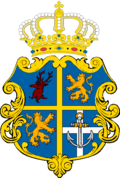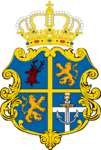Grand Duke of Francisville
| Grand Duke of Francisville | |
|---|---|
| Former Monarchy | |

| |
| Crest of Francisville | |
| Last Monarch: James I | |
| First monarch | James I |
| Last monarch | James I |
| Official residence | Kirkburgh House, Francisville |
| Appointer | Elective |
| Monarchy started | 28 November 2008 |
| Monarchy ended | 3 June 2011 (de facto) 21 August 2012 (de jure) |
The Grand Duke of Francisville (French: le grand-duc de Francisville, Francillian: Groussherzueg vu Frankestädt) was the sovereign monarch and head of state of the Democratic Duchy of Francisville. The institution dated from Francisville's foundation in 2009 when the title replaced the briefly existing office of the Archduke of Francisville. James I served as the only Grand Duke from the foundation of the monarchy to its abolishion by his own initiative in June 2011. The Grand Duke was a constitutional office specifically defined and limited in role by the Constitution of Francisville within the framework of a parliamentary democracy. The Grand Duke reigned for a life-long term although the office was elective as opposed to hereditary, an unusual arrangement for a constitutional monarchy.
Grand Duke James I relinquished his powers as head of state through the Declaration of the Republic which was accepted by the public in a referendum held on 10 June 2011. However, the institution was arguably not officially abolished until the enactment of the Constitution of the Federal Republic of Francisville on 21 August 2012. Following the abolition of the monarchy, the function of head of state was succeeded by the Federal Council of Francisville as a directory.
History
Francisville was founded by James Stewart by the adoption of the First Constitution on 28 November 2008.[1] The form of state adopted differed considerably from the model of constitutional monarchy which later developed. Founded provisionally as a powerful elective monarchy, the roles of head of state and nominal head of government were merged into the office of the Archduke (or Grand Duke, if some national honour was held by the office holder) who acted as an executive prince-president. The constitutional structure was based on a modified semi-presidential system. Executive power rested primarily with the Archduke but it was partly shared with a Prime Minister elected by a House of Representatives. The House of Peers as the upper house of parliament had the authority to impeach the Archduke by unanimous vote. However, Emergency Article I.vii. of the constitution granted the Archduke executive authority over all non-constitutional affairs in circumstances of war, political disfunction, or low citizenship. Francisville was thereby de facto an absolute elective monarchy constrained by the constitution.
Following the First Constitutional Assembly on 16 January, the Second Constitution was adopted and the political system transitioned towards a model of constitutional monarchy in the form of a Grand Duchy whereby the Grand Duke served as head of state and a more powerful Prime Minister was elected to serve as the head of government. The bicameral parliament was abolished in favour of a unicameral National Assembly. The emergency clause was not removed from this updated constitution thereby allowing the Grand Duke to assume the office of de facto Prime Minister during the subsequent session of the National Assembly. leading to the Third Constitution being brought into force on 5 March 2009.[2] Reforms were introduced including more extensive constitutional protections of individual rights, the restructuring of the judiciary, and the introduction of layers of local government. In spite of the reforms, a proposed general election in April 2009 was cancelled. A consensus was reached that further reforms should be introduced to streamline the constitutional structure of the national government and end the Grand Duke's emergency powers.
Following the recommendations of a Second Constitutional Assembly (sometimes referred to as the "April Convention") organised by the Grand Duke, the Fourth Constitution was adopted on 15 May 2009. The provisions of this constitutional remained until the dissolution of the Duchy in 2011. The Grand Duke now served as a largely figurehead head of state, retaining powers which were largely representative and ceremonial in nature. The responsibilities of the Grand Duke included the promulgation of adopted legislation, the official appointment of judges, and acting as ceremonial commander-in-chief of the armed forces. However, the Grand Duke was granted executive authority over foreign affairs. His signature was required for the adoption of any foregin treaties and he acted as the government's principal representative to international organisations. The Grand Duke therefore exercised considerable power and influence over foreign policy which would have been considered unconstitutional in any matter of domestic affairs. Unusually, the office of Grand Duke was subject to elective succession, serving for life until vacating the office by death, abdication or, in rare circumstances, impeachment. This principle was the basis for the state being referred to as a "Democratic Duchy" with the Grand Duke serving as a popular "prince-president".
On 3 June 2011, James I issued a declaration calling for the dissolution of the Fourth Constitution and the transition to an alternative model of government. The declaration was endorsed by the Chamber and later became known as the Declaration of the Republic.[3] The Grand Duke's constitutional reform proposals were accepted by the population in a referendum held on 10 June 2011. The referendum result returned 100% in favour of constitutional reform but with a voter turnout of only 45%. The declaration called for the reforms to be decided by the process of a citizens' assembly directed by a Convention Council comprised of the incumbent Deputies. The assembly became known as the June Convention. The first assembly, held between 13 and 17 June, moved in favour of a federal republic composed of largely autonomous Cantons. A further seven national surveys and binding referendums were held until the Constitution of the Federal Republic of Francisville was officially adopted on 21 August 2012, being accepted by 100% of voters with a 57% voter turnout. The Democratic Duchy of Francisville and the Monarchy were thereafter declared to be officially dissolved.
Constitutional role
The 4th Constitution of Francisville, adopted on 15 May 2009 established the Democratic Duchy as a parliamentary representative democracy in the form of a constitutional monarchy with a strict separation of powers between executive, legislative, and judicial functions. Although this framework granted the Grand Duke defined yet limited powers over each of these three functions, the overall position of the institution was a ceremonial figurehead with limited personal prerogative. Unlike many constitutional monarchies, the Grand Duke was not even the nominal chief executive, that function being expressly vested in the Government of Francisville led by the First Minister. This principle was the basis for the state being referred to as a Democratic Duchy with the Grand Duke serving as a popular prince-president within an arrangement properly defined as a crowned republic. The Grand Duke did, however, maintain certain limit constitutional powers which could be exercised at their discretion:
- Legislative powers:
- Speaker of the Chamber of Deputies: The Grand Duke served ex officio as the Speaker of the legislature thereby exercising an important role in the legislative process. This office was exercised under strict conditions of political impartiality. The Grand Duke was not considered to be a member of the Chamber and therefore had no voting rights even in the case of a tie-breaking vote.
- Introducing bills: The Grand Duke had the right to introduce bills to the Chamber under their own prerogative. Constitutional convention dictated that this right could only be used in exceptional circumstances so as to avoid compromising their role as Speaker.
- Promulgation of laws: The Grand Duke officially promulgated all laws adopted by the Chamber. Unusually for a constitutional monarchy, Francisville had no requirement of royal assent. Laws were therefore considered in force as soon as they were adopted by the Chamber regardless of the opinion of the head of state.
- Executive powers:
- Foreign relations: Foreign relations were under the direct executive authority of the Grand Duke. As well as appointing all foreign ambassadors, their signature was required for the adoption of all foreign treaties and they served as the principal representative to all foreign organisations. The Grand Duke therefore exercised considerable power and influence over foreign policy which would have been considered unconstitutional in any matter of domestic affairs, albeit with significant deference to the opinions of the incumbent government.
- Chief appointments officer: The Grand Duke officially appointed numerous positions within the state including foreign ambassadors, chief civil servants, military officers, and foreign ambassadors. These appointments were normally subject to consultation with the government although the Grand Duke could exercise significant personal discretion in most instances.
- Commander-in-Chief: The Grand Duke was commander-in-chief of the Ducal Defense Force serving ex officio as the Commander-General of the Land Component and Grand Admiral of the Naval Component. These powers were exercised in collaboration with the Cabinet Secretary for Defence.
- Judicial powers:
- Judicial appointments: The appointment of all judges was made by the Grand Duke with the co-signature of the First Minister.
- Power of pardon: The Grand Duke had the power to issue pardons upon the advice of the High Court of Francisville.
In addition to these powers, the Grand Duke exercised significant ceremonial authority. Their role included receiving all foreign ambassadors and visiting heads of state, conducting state visits on behalf of Francisville, opening and dissolving sessions of parliament, and addressing the nation on significant occasions including National Day and Christmas Eve. The Grand Duke was constitutionally recognised as the fount of honour with the power to gift and remove all peerages and awards as well as being ex officio Grand Commander of all national orders.
Styles and Standards
| Styles of The Grand Duke/Duchess of Francisville | |

| |
| Reference style | His/Her Grace |
|---|---|
| Spoken style | Your Grace |
| Alternative style | Sir/Madam |
The full titular style of the monarch was His/Her Grace, Grand Duke/Duchess of Francisville. The more formal title His/Her Grand Ducal Highness was sometimes used during the early period of the Grand Ducal office following the establishment of the 2nd Constitution of Francisville in January 2009 but quickly fell out of use. The customary spoken form of address was Your Grace although Sir/Madam was also acceptable.
The style of the monarch was variable in form when exercising particularly constitutional functions. On account of the Grand Duke's role as Foreign Minister, the office holder typically adopted a less formal diplomatic style in order to establish them as representative of the government in foreign affairs. Whilst fulfilling their role as foreign representative to international organisations, the customer title was His/Her Excellency [Full Name], Francillian Foreign Representative and Grand Duke/Duchess of Francisville. When serving as the speaker of the Chamber of Deputies, it was expected that Deputies referred to the monarch by their formal style of Your Grace and not Mr/Madam Speaker as is customary in parliamentary systems. The latter form, however, was used for any Deputy deputizing for the monarch in this role.
A Grand Ducal standard was introduced in May 2009 although the national flag was more commonly used to represent the office, particularly in an international capacity. It was not customary for the monarch to adopt personal arms but rather to use the Coat of Arms of Francisville. This was also used by all official state institutions including the First Minister of Francisville and the Chamber of Deputies.
-
Grand Ducal Standard, adopted in May 2009.
-
Coat of Arms of Francisville.
-
National Flag of Francisville
See also
References
- ↑ National Archives of Francisville: Constitution (2008) Retrieved 27/11/2016.
- ↑ National Archives of Francisville: Constitution (March 2009) Retrieved 27/11/2016
- ↑ Declaration of the Republic Accessed 22/01/17


